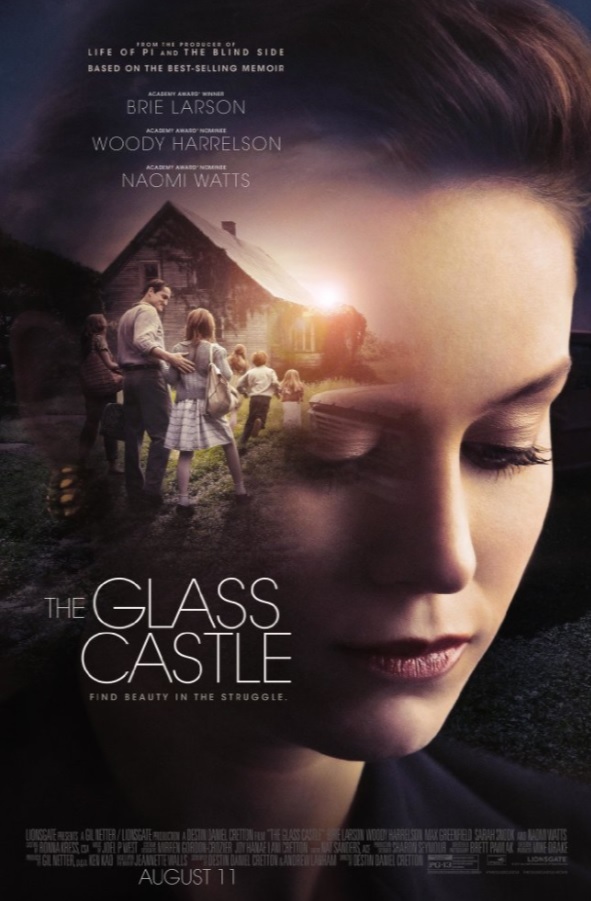THE AISLE SEAT - by Mike McGranaghan
"THE GLASS CASTLE"

Jeannette Walls made a name for herself as a gossip columnist. In the end, though, her juiciest scoop was about her own family. The Glass Castle is based on her memoir, which details a difficult, dysfunctional upbringing that nevertheless vitally shaped the successful, well-adjusted woman she grew up to be. Directed and co-written by Destin Daniel Cretton (Short Term 12), the film digs deep into the kinds of troubles that can pop up among people who are bound together by the ties of family.
Brie Larson plays Jeannette. When we first meet her, she's just become engaged to David (Max Greenfield), a guy who works in finance. The story flashes back to her childhood, where she, her two sisters, and her brother live a nomadic existence. Father Rex (Woody Harrelson) is an alcoholic who distrusts anything that reeks of the system. Mother Rose Mary (Naomi Watts) is a hippy-dippy artist more than happy to support her husband in whatever crazy idea he has.
These early scenes are fascinating, as they show the clan abruptly picking up and moving whenever Rex loses a job or they're kicked out of wherever they've been squatting. We can see that the children accept this lifestyle. It's all they've ever known, so they simply roll with it. Rex repeatedly assures them that things will get easier with each new move, and that he'll someday build them a glass castle to live in. Ella Anderson (from Nickelodeon's Henry Danger) portrays Jeannette as a child. She gets one of the best scenes, in which the wise-beyond-her-years character begs her father to stop drinking, recognizing that his addiction is making any kind of improvement impossible.
The back half of The Glass Castle has the now older Jeannette realizing that she has to get away from what she has begun to realize are toxic family dynamics. She does, going on to become a working writer in NYC who tries to distance herself from the now-homeless parents who refuse to accept that decision. We see the resentment that has bubbled up, more prominent as Jeannette takes stock of how far from her upbringing she has gotten. She feels like a survivor, unwilling to return to the scene of her captivity.
The Glass Castle incorporates a lot of elements: poverty, addiction, neglect, sexual abuse, and so on. The primary theme, however, is that it's possible to love someone despite their deep flaws. In a moment that occurs during the final half-hour, Jeannette's brother says of Rex, He's done some shitty things, but he's had his moments. And it's true. The story shows Rex as borderline abusive, yet also depicts instances of great compassion and encouragement. Jeannette has to figure out whether she can reconcile the things he's done right with the many things he's done wrong. There's great truth in this idea: it usually is easier to see the bad than it is the good, because the bad pushes itself to the front of our consciousness and won't easily go away.
The theme resonates thanks to the performances, which are powerful across the board. Brie Larson skillfully shows how Jeannette moves from acceptance and affection, to anger and bitterness, to clear-eyed compassion in regard to her father. It's another remarkable turn from the actress. Naomi Watts gets a poignant scene in which Rose Mary explains to her daughter why she will never leave her husband. It's an overt moment, yet Watts meaningfully imbues the character with that unflagging loyalty even when it's unspoken.
Woody Harrelson, meanwhile, gives one of his deepest, most persuasive performances as Rex. This is a challenging role, as it requires bringing out the humanity in a guy who, frankly, does some pretty appalling stuff. We could easily judge Rex and with good reason but the film falls apart if we see him as nothing but a jerk. To his credit, Harrelson makes it clear that this man's worst instincts are driven by the fear and pain within. He's outstanding.
Movies about dysfunctional families tend to be either overloaded on quirk (Captain Fantastic) or too melodramatic (the screen version of August: Osage County). The Glass Castle mostly finds just the right note, feeling very authentic in both the lighter and the darker moments. It concludes, as most movies based on true stories do these days, with pictures and video of the real-life subjects. That approach works in this case. By the end, we feel like we know the Walls family intimately. Why not see them for real, given how deeply touching the adaptation of their story is?
(![]()
![]()
![]() 1/2 out of four)
1/2 out of four)
The Glass Castle is rated PG-13 for mature thematic content involving family dysfunction, and for some language and smoking. The running time is 2 hours and 7 minutes.
Buy a copy of my book, "Straight-Up Blatant: Musings From The Aisle Seat," on sale now at Lulu.com! Paperback and Kindle editions also available at Amazon.com!


